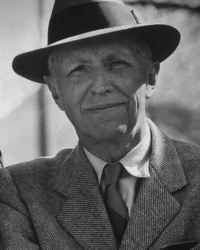Conrad Richter facts for kids
Quick facts for kids
Conrad Richter
|
|
|---|---|
 |
|
| Born |
Conrad Michael Richter
October 13, 1890 Pine Grove, Pennsylvania, U.S.
|
| Died | October 30, 1968 (aged 78) Pottsville, Pennsylvania, U.S.
|
| Nationality | American |
| Occupation | Novelist |
| Years active | 1924–1968 |
| Known for | The Sea of Grass, The Light in the Forest, The Town, The Awakening Land |
| Spouse(s) | Harvena Maria Achenbach (died in 1972) |
| Children | 1 |
Conrad Michael Richter (born October 13, 1890 – died October 30, 1968) was an American writer. He wrote many novels about life on the American frontier.
His book, The Town (1950), was part of a series called The Awakening Land. This series was about the Ohio frontier. The Town won the famous Pulitzer Prize for Fiction in 1951. His novel The Waters of Kronos also won a big award, the National Book Award for Fiction, in 1961.
Contents
Conrad Richter's Early Life
Conrad Michael Richter was born in 1890 in Tremont, Pennsylvania. His father, John Absalom Richter, was a Lutheran minister. Conrad's grandfather, uncle, and great-uncle were also Lutheran ministers. Their family came from German immigrants who settled in America a long time ago.
As a child, Richter lived in several small mining towns in central Pennsylvania. Here, he met people whose families had been pioneers in the 1700s and 1800s. They shared many old family stories. These stories later inspired him to write historical fiction about the changing American frontier. Richter finished high school at age fifteen.
Starting His Career and Family
At 19, Richter began working as an editor for a local newspaper called the Patton Courier. In 1911, he moved to Cleveland, Ohio, and worked as a private secretary.
Richter married Harvena Maria Achenbach in 1915. They had one child, Harvena Richter, in 1917. Richter later worked for a small publishing company and started a magazine for young people. He also began writing short stories.
In the 1930s, he worked briefly as a screenwriter for Metro-Goldwyn-Mayer Studios in Hollywood, California.
His First Stories
Conrad Richter kept writing and trying to sell his short stories. In 1914, his short story "Brothers of No Kin" was published in Forum magazine. A famous editor, Edward J. O'Brien, called it the best American short story published that year. This story was later re-released in a collection after Richter's death.
In 1928, Richter moved to Albuquerque, New Mexico, because his wife was not well. While there, he gathered many ideas for stories about the old Southwest frontier. By 1933, Richter and his wife moved back to his hometown of Pine Grove, Pennsylvania. They later spent time living in Pine Grove, Albuquerque, and Florida.
Conrad Richter's Writing Career
In the early 1930s, Richter had many stories published in popular magazines. His book Early Americana and Other Stories (1936) was his first big success.
He continued to write and publish full-length novels. Richter's novels were often set in different times on the American frontier.
Famous Novels and Movies
He is well-known for The Sea of Grass (1936). This book is set in New Mexico in the late 1800s. It tells about the struggles between ranchers and farmers. The Sea of Grass was later made into a movie in 1947. It starred famous actors like Katharine Hepburn and Spencer Tracy.
Another popular novel was The Light in the Forest (1953). This story takes place in Pennsylvania and Ohio in the late 1700s. It's about a young white man who was captured as a child and raised by Lenape Native Americans. When he was returned to white society, he faced many challenges. This book also became a movie in 1958. Richter wrote another book, A Country of Strangers (1966), which also explored the idea of a white child raised in a different culture. Both books showed things from the Native American point of view.
The Awakening Land Trilogy
Richter also wrote a series of novels called The Awakening Land. These books are about the Ohio frontier. The series includes:
- The Trees (1940)
- The Fields (1946)
- The Town (1950)
In 1947, The Fields won the Ohioana Book Award. The Town won the Pulitzer Prize in 1951. All three books were published together in one volume in 1966.
Later Works and Awards
Richter's short story, "Doctor Hanray's Second Chance," was published in The Saturday Evening Post in 1950. It was about making peace with the past. Richter explored this idea again in his 1960 novel, The Waters of Kronos. Kronos was the ancient Greek god of Time. This novel won the U.S. National Book Award in 1961.
After Richter passed away, two collections of his short stories were published. Many of his novels have also been reissued by universities.
Awards and Honors
Conrad Richter received many national and regional literary awards. He also received several honorary doctorates from universities.
- 1937 – Nominated for the National Book Award for The Sea of Grass.
- 1942 – Won the Gold Medal for Literature from New York University for The Sea of Grass and The Trees.
- 1947 – Won the Ohioana Library Medal for The Fields.
- 1951 – Won the Pulitzer Prize for Fiction for The Town.
- 1959 – Received a grant for literature from the National Institute of Arts and Letters.
- 1959 – Won the Maggie Award for The Lady.
- 1961 – Won the National Book Award for The Waters of Kronos.
- He received honorary doctorates from Susquehanna University (1944), University of New Mexico (1958), Lafayette College (1966), Temple University (1966), and Lebanon Valley College (1966).
- 1967 – Won the Florence R. Head Memorial Award.
 | Roy Wilkins |
 | John Lewis |
 | Linda Carol Brown |

